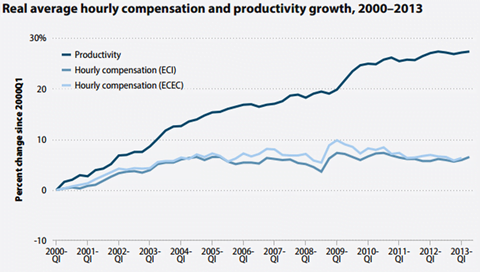Housing Wire put their finger on the nerve of the whole rising rents crisis: it keeps the middle class from being able to buy.
This is especially true in California, where some of the hottest job markets and thus highest rents reside. In order to afford the average rent in San Jose, an individual needs to make a salary of at least $62,400, according to HW.
A recent Moody’s report showed apartment prices are 6.4% higher than their pre-financial crisis peak. This thinking basically washes the real estate bubble out of the equation to get a realistic idea of price increases. 6.4% is substantial in the rental world since rents are so intimately tied to wages. Wages, as is by now well documented, have been stagnant since at least the year 2000. The chart below tells it all.
 Chart courtesy of the Economic Policy Institute
Chart courtesy of the Economic Policy Institute
But Californians earn more, right? Maybe a little. According to the Census Bureau’s most recent data, the median California household income is about $61,000 per year. Based on the 30% rule, this means the average California household ought to be spending about $1,500 a month on rent. Well, average Los Angeles Metro rent was $2,365 as of March 2014, according to Zillow. Average San Francisco rent? $2,711.
Related article:
So the two questions that come to the fore when facing these facts are:
- why are rents increasing so dramatically; and
- how are the rent spikes affecting the real estate market?
The former question is easy to answer. We’ve covered the speculator-driven mini-bubble since its inception in 2012 and through the bidding wars of 2013. Investors buy properties for one reason: to make a return. The increasing rents across California are the logical outcome of speculators attempting to capture the maximum return on what may prove to be bad (overpriced) investments. Couple this factor with intense rental demand due to a soft home sales market and you have a recipe for rising rents.
As far as the second question goes, the truth may hurt. We are in the midst of a vicious cycle right now. Everyone forced to sign a lease during this unstable rental market will inevitably devote a substantial amount (more than 30%) of their income to rent.
This means, as the HW article notes and as we’ve reported many times in recent months, rentals will cease to function as homeownership incubators since there is no room in Californians’ budgets to save for a down payment.
These vicious cycles are difficult to break. It’s important to remember that rents will inevitably decline, even with lackluster affordable developments, once speculators take their medicine and accept the dreaded break-even or even a loss.



















